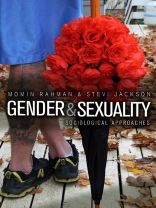This new introduction to the sociology of gender and sexuality offers a fresh take on the importance of these concepts in modern society. It provides an insight into our rapidly changing attitudes towards sex and our understanding of masculine and feminine identities, relating the study of gender and sexuality to wider social concerns throughout the world and presenting a comprehensive yet readable summary of recent research and theory.
In an accessible and engaging style, the book demonstrates how thinking about gender and sexuality can illuminate and enliven other contemporary sociological debates about social structure, social change, and culture and identity politics. Emphasis is placed on the diversity of gendered and sexual lives in different parts of the world. The book offers detailed coverage of wide-ranging topics, from international sex-tourism to celebrity culture, from gender in the work-place to new sexual lifestyles, drawing examples from everyday life.
By demonstrating the links between gender and sexuality this book makes a clear case for thinking sociologically about these important and controversial aspects of human identity and behaviour. The book will be of great value to students in any discipline looking to understand the roles gender and sexuality play in our lives.
Table of Content
Introduction.
Notes and Resources for Further Study.
Part One: The Development of Sociological Thought on Gender
and Sexuality.
Chapter 1: The Trouble with ‘Nature’.
Learning Outcomes.
Notes and Resources for Further Study.
Part Two: Social Structure and Inequalities.
Introduction to Part Two.
Chapter 3: Gender, Sexuality and Structural Inequality.
Chapter 4: The Idea of Patriarchy.
Chapter 5: Rethinking Gendered and Sexual Inequalities.
Learning Outcomes.
Notes and Resources for Further Study.
Part Three: Culture, Ideology and Discourse.
Introduction to Part Three.
Chapter 6: Gender and Sexuality as Cultural Constructs.
Chapter 7: Critical Perspectives on Knowledge.
Chapter 8: The Complexity of Contemporary Culture.
Learning Outcomes.
Notes and Resources for Further Study.
Part Four: Self, Identity and Agency.
Introduction to Part Four.
Chapter 9: The Socialization Paradigm and its Critics.
Chapter 10: Becoming Gendered and Sexual.
Chapter 11: Sexual Selves in Global Late Modernity.
Learning Outcomes.
Notes and Resources for Further Study.
Part 5: Conclusion.
Chapter 12: Power, Politics, Identities and Social Change.
Notes and Resources for Further Study.
Bibliography.
About the author
Momin Rahman is Assistant Professor of Sociology at Trent University, Canada.
Stevi Jackson is Professor of Women’s Studies and Director of the Women’s Studies Centre at the University of York.












